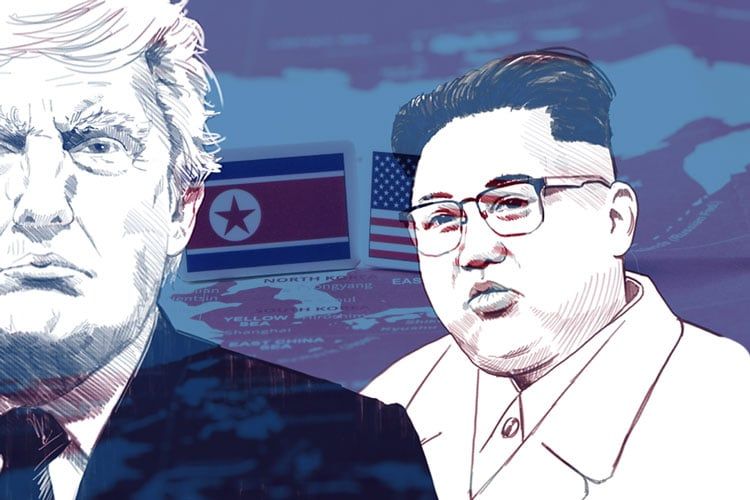Charisma in the nuclear age
By Sharon Squassoni | June 21, 2018

From his speech patterns to his body language, President Donald Trump exudes charisma. Perhaps to the despair of more stalwart democratic leaders, he acts instinctively rather than methodically. His approach to the historic Singapore summit with North Korean leader Kim Jong Un was, he told the press, to size up Kim in the first few minutes and ascertain whether a deal was possible.
And so it was. On the heels of a testy G-7 summit and months of name-calling between Trump and Kim, observers may be grateful that the summit went so well. The two leaders smiled, shook hands, and posed for the cameras. They shared a meal and signed a single page of vague goals that may or may not be realized. And while President Trump personally assured US citizens on Twitter that they could all sleep more safely on Tuesday evening because of the summit, there are many miles to go before anyone sleeps.
Charisma in the nuclear age is a bitch. A century ago, the great German sociologist Max Weber showed that modern political authority has two varieties: charismatic and bureaucratic. Charismatic authority is based on personality and is disruptive; bureaucratic authority is based on rules and promises continuity. Does this sound like two presidential candidates in the 2016 US election? We know who won.
Disruption has its virtues, and while Donald Trump’s campaign statements illustrated his limited understanding of the North Korean nuclear crisis, they also showed he was fearless in his embrace of unorthodox approaches to solving the problem. He called Kim Jong-un a “maniac,” but said—more than a year ago—that he was willing to negotiate with him. Candidate Trump believed China had “total control” over North Korea and could make Kim “disappear.” Ignoring decades of historical context, he flirted with taking troops out of South Korea and Japan and suggested he could support Japan’s development of nuclear weapons in response to North Korea.
As president, Trump’s approach to North Korea’s nuclear weapons has ricocheted from a strategy of isolation and maximum pressure designed to topple Chairman Kim to speculation about beachfront condos replacing missile test launch sites. Expert heads are spinning.
While Trump has focused on his personal relationship with Kim (bad or good), bureaucrats have been left to tidy up the messy details, like guessing which targets might be within range of Kim’s nuclear-tipped missiles, ensuring that missile alerts don’t falsely terrify ordinary people in Hawaii, and musing about whether a deterrence relationship with North Korea is even possible. (They concluded it wasn’t, in part because Kim continued to burnish his brutal dictator brand with firing squads and nerve agent assassination for those deemed a threat or an annoyance to him. Not to mention the long list of human rights violations he has inflicted on his people.).
Trump’s charismatic and chaotic brand of leadership may have helped jump-start talks about North Korea’s nuclear program, but it is inherently dangerous. Eight months ago, the world worried that the personal animosity could cause Trump and Kim to stumble into war; today, the world worries that Trump’s new-found admiration of Kim could lead to the ruin of post-war alliances that have helped to stabilize Northeast Asia. Japan has largely been sidelined, and South Korea was blindsided by Trump’s casual reference during the summit to the end of war-games. Exactly how that US concession will play out is still unclear. Both allies will likely try to make the best out of a bad situation.
The only hope for successful denuclearization will require Trump and Kim to step back and let their worker bees establish a methodical process by which commitments on both sides can be assessed. The only way to make real progress is to establish baselines, identify weapons of mass destruction capabilities, eliminate or somehow repurpose them, and put in place monitoring to ensure those capabilities are not reconstituted.
This is unsexy and uncharismatic work—exactly the kind of thing that we pay disinterested bureaucrats to accomplish. Hopefully, experts with decades of experience—experts therefore unlikely to be fooled by North Korean disinformation—can be put to the task. A few have recently left the State Department; only one seasoned expert on North Korea, Ambassador Sung Kim, was on the US delegation in Singapore.
Unfortunately, Trump has little appreciation for the nuts and bolts of governing, and his administration has devoted considerable attention to stripping away government capabilities. With luck, Secretary of State Mike Pompeo may be able to find experts who are willing to work on this enormous task. He should look beyond the intelligence community. He needs real diplomats, too.
One small but curious element of the Singapore joint statement was a reference to this as a “first historic summit.” President Trump told the press that he and Kim might meet many times, even at the White House or in Pyongyang. For the sake of democracy and global security, we don’t need more summits. It’s time instead to let US government experts do what they do best—careful, cautious negotiation and implementation that produce lasting, verifiable results.
Together, we make the world safer.
The Bulletin elevates expert voices above the noise. But as an independent nonprofit organization, our operations depend on the support of readers like you. Help us continue to deliver quality journalism that holds leaders accountable. Your support of our work at any level is important. In return, we promise our coverage will be understandable, influential, vigilant, solution-oriented, and fair-minded. Together we can make a difference.
Topics: Nuclear Risk, Nuclear Weapons, Opinion















